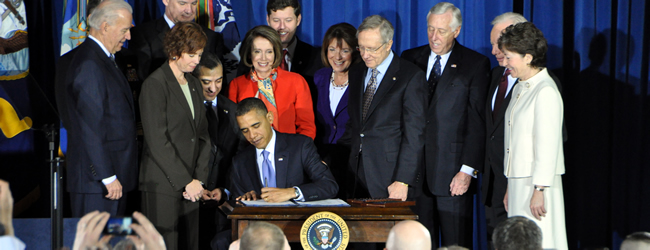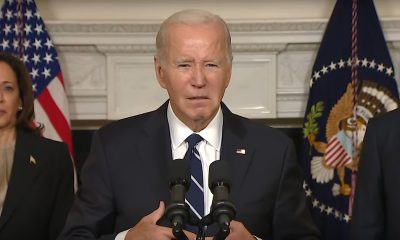National
YEAR IN REVIEW: ‘Don’t Ask’ repeal is year’s top story
Rollercoaster fight ends with Obama’s signature

The passage of legislation to end the 17-year-old ban on service by open gays in the U.S. military after a year-long fight makes the “Don’t Ask, Don’t Tell” saga the story of the year for 2010.
Throughout the course of the year, supporters of “Don’t Ask, Don’t Tell” repeal endured a rollercoaster ride during which many observers predicted efforts to lift the military’s gay ban would end in failure.
In January, President Obama set up the path for repeal in his State of the Union address.
“This year, I will work with Congress and our military to finally repeal the law that denies gay Americans the right to serve the country they love because of who they are,” Obama said. “It’s the right thing to do.”
Efforts to repeal “Don’t Ask, Don’t Tell” got a significant boost in February during a Senate Armed Services Committee hearing when Chairman of the Joint Chiefs of Staff Adm. Mike Mullen announced that he personally supports the service of openly gay people in the U.S. military.
“It is my personal belief that allowing gays and lesbians to serve openly would be the right thing to do,” Mullen said. “No matter how I look at the issue, I cannot escape being troubled by the fact that we have in place a policy which forces young men and women to lie about who they are in order to defend their fellow citizens.”
Mullen’s support for ending “Don’t Ask, Don’t Tell” is seen by many as the lynchpin that ultimately led to repeal of the law because he is an authoritative voice in the military and was seen as outside the influence of LGBT advocates.
During the same hearing, Defense Secretary Robert Gates unveiled plans to establish a Pentagon working group study of “Don’t Ask, Don’t Tell” that would determine the best way to implement repeal of the law should Congress should take action. Gates appointed Jeh Johnson, the Pentagon’s general counsel, and Gen. Carter Ham, commander of U.S. Army Europe, as co-chairs of the working group, and directed them to produce a study by Dec. 1.
At the same hearing, U.S. senators opposed to “Don’t Ask, Don’t Tell” repeal expressed consternation over plans to move forward and Mullen’s declared support for allowing gays to serve openly in the armed forces.
Sen. John McCain (R-Ariz.) said he was “deeply disappointed” by Gates’ statement and the defense secretary’s plans to move forward with a study to determine how to implement repeal of “Don’t Ask, Don’t Tell” as opposed to whether it should be repealed.
As the study on implementing an end to “Don’t Ask, Don’t Tell” was underway, those seeking to end the law made plans to pass a repeal of the law as part of major defense budget legislation pending before Congress as part of the fiscal year 2011 defense authorization bill. In 1993, “Don’t Ask, Don’t Tell” was enacted into law as part of the defense authorization bill and LGBT advocates believed attaching a measure as part of defense spending legislation would bolster chances for success of repeal.
But the path to passage of repeal encountered a significant roadblock in April when Gates wrote a letter to Congress saying he’s “strongly opposed” to any legislative change to “Don’t Ask, Don’t Tell” before the Pentagon study is complete.
Many thought Gates had doomed any chances for legislative repeal of “Don’t Ask, Don’t Tell.” But repeal advocates came forth with a compromise measure that would institute an end to the law only after the Pentagon report was finished and the president, defense secretary and chairman of the Joint Chiefs of Staff certify that the U.S. military is ready.
The White House and Pentagon issued statements saying pursuing legislation after the Pentagon study is complete would be the ideal way to address repeal, but that they could support the proposed compromise legislation.
In May, the House attached the repeal measure as part of the defense authorization bill as an amendment by a vote of 234-194 before approving the legislation as a whole. On the same day, the Senate Armed Services Committee did the same to its version of the bill before reporting it out to the Senate floor.
On the House floor, Rep. Patrick Murphy (D-Pa.), an Iraq war veteran and the sponsor of repeal legislation, urged his colleagues to approve an end to the military’s gay ban.
Following the votes, the prospects for “Don’t Ask, Don’t Tell” repeal seemed bright. But the efforts to move forward with the legislation were stymied as the Senate didn’t take up the measure for months. In July, McCain objected to a motion to proceed to the defense authorization bill upon lawmakers’ return from August recess.
In September, Senate Majority Leader Harry Reid (D-Nev.) file cloture to proceed on the defense authorization bill regardless of the objections from any other senator.
At first, many LGBT advocates were confident that 60 votes were present in the U.S. Senate to proceed to defense legislation over McCain’s objection. But this support began to crumble away as many U.S. senators said they disapproved of the limited number of amendments that would be allowed.
On the Senate floor, Sen. Susan Collins (R-Maine), who voted for the repeal amendment in committee, was among those expressing discontent over the procedural conditions for the defense authorization.
The motion to proceed on the defense authorization bill failed 56-43, four votes short of the 60 votes necessary to proceed with the legislation. Reid pledged to bring up the legislation again, but the bill’s fate was uncertain.
When Republicans took control of the House in the November elections, it became clear that Congress needed to act before the end of the year.
With the legislative route to ending “Don’t Ask, Don’t Tell” in limbo, another route to end the military’s gay ban opened up in September when a California federal court ruled that the law was unconstitutional in the case of Log Cabin Republicans v. United States.
In October, U.S. District Court Judge Virginia Phillips affirmed her earlier ruling by issuing an injunction enjoining the U.S. government from the enforcement of “Don’t Ask, Don’t Tell.”
The U.S. Justice Department appealed the decision to the U.S. Ninth Circuit Court of Appeals and asked for a stay in the injunction, arguing that the Pentagon needs time to implement a repeal of the law.
On Oct. 21, the Ninth Circuit granted the stay in the injunction, ending the eight-day period in which gays could serve openly in the U.S. military.
But the court action put increased pressure on Congress to repeal “Don’t Ask, Don’t Tell” before the year was out. White House Press Secretary Robert Gibbs maintained Congress should repeal “Don’t Ask, Don’t Tell” legislatively before the courts strike down the statute to provide the Pentagon more wiggle-room with implementation.
Efforts to repeal “Don’t Ask, Don’t Tell” received another significant boost on Nov. 30 when the Pentagon finally released its study and found that repeal could be implemented with low risk to the armed forces over the long term.
The 256-page report included the results of survey sent out to 400,000 service members regarding openly gay people in the U.S. military. Of the more than 115,000 who responded, 70 percent said they believed repeal would have a positive, mixed or no effect on a unit’s ability to get the job done.
Hopes were high that with the Pentagon report, the Senate would be able to move forward with the defense authorization and “Don’t Ask, Don’t Tell” repeal. But those hopes were dashed on Dec. 9 when a motion to proceed on the defense authorization bill failed 57-40.
Immediately following the vote, Sen. Joseph Lieberman (I-Conn.) and Collins called a news conference and announced they would introduce stand-alone “Don’t Ask, Don’t Tell” legislation — a move seen by many as a “Hail Mary” pass to make repeal happen before the end of the year.
With limited time remaining in the lame duck session, the U.S. House on Dec. 15 approved “Don’t Ask, Don’t Tell” yet again as a standalone measure by a vote 250-175. The move enabled the House to send the legislation to the Senate as “privileged” bill, shaving off the first 30 hours of debate that would have otherwise been needed in the Senate.
After the Senate approved the extension of the Bush-era tax cuts, repeal advocates became optimistic that 60 votes were present to support the legislation as Sens. Scott Brown (R-Mass.), Lisa Murkowski (R-Alaska), Olympia Snowe (R-Maine) signaled they would support repeal.
On Dec. 18, repeal advocates finally cleared the last major hurdle for “Don’t Ask, Don’t Tell” when the Senate invoked cloture on the legislation by a vote of 63-33. On the same day, the Senate agreed to final passage of the bill by a vote of 65-31.
LGBT advocates heralded the Senate vote — the first time Congress has approved a pro-gay bill as a standalone measure — as an unprecedented accomplishment for LGBT Americans.
President Obama brought to a close on Dec. 22 the legislative journey to end “Don’t Ask, Don’t Tell” when he signed the repeal legislation into law.

It is common knowledge that women earn 84% of the average worker. Less common knowledge? Trans women earn 60% of the average worker. Trans men and non-binary people come in at around 70%, while 16% of all trans people make less than $10,000 annually.
E.C. Pizarro was lucky, and he knew it. He had a BFA in graphic design and had taught himself how to code. As a stealth trans man in a corporate job, he had access to a stable wage and good benefits. “People that do not have experiences in corporate America or with equitable employment don’t realize [these things] are privileges that a lot of people don’t have access to.”
He wanted to give back and was gearing up to bring more volunteer work into his life by participating in a fraternity for trans men. When he went to a TransTech event and learned about the educational and career resources for trans people who face barriers to entering the workforce, he knew he had found his place.
At the event he met, Angelica Ross. Yes, that Angelica Ross, of “Pose” and “American Horror Story.”
Before she was Candy, Ross was a self-taught coder. She went from posing for an adult website to doing its back-end coding to teaching her trans siblings how to succeed in tech.
“Technology was the key to my freedom,” Ross said in an interview with The Plug. “Technology took me from being exploited on someone’s website to building my own websites and to building websites for other people and getting paid to do so.”
Pizarro was impressed and wanted to help. “I went up to Angelica and I was like ‘Hey, I’m a trans man. These are my skills. I’m down to volunteer and do any type of work—the one caveat is that I’m stealth. You can’t tell anybody that I’m trans.’”
For four years, Pizarro helped from mostly behind the scenes, sometimes getting side-eyed since people thought he was a cis man in trans spaces. “I was still stealth as the Director of Social Media and Communications for the National Trans Visibility March in 2019,” Pizarro says, chuckling a little.
But by that point, Ross — who headlined the 2019 march — was overextended trying to balance being a world-famous actress, advocate, and businesswoman.
She needed someone to step in as executive director of TransTech and looked to the group of dedicated volunteers. Pizarro was elected by his peers to take the reins of the organization.
This was a turning point for Pizarro. “I’m very passionate about tech and for me a small sacrifice of being open with my trans experience to liberate other trans people,” he said. “I felt like if that’s something I got to do, then I’m gonna do it.”
And he did it. The infrastructure Ross put together worked: with mentorship, education, community, and networking with trans-accepting employers, trans people were gaining financial security and independence.
So, Pizarro focused on expanding TransTech as widely as possible. “We have grown exponentially over the last three years,” he says. “When I took over in 2021, we had about 800 members based in the United States. Now we support over 6,700 members across 50 countries.”
TransTech is filling a demonstrated need within specifically the trans community. New research from LGBT Tech found that 68% of transgender adults use the internet to find LGBTQ-friendly employment (compared to 38% of cisgender LGBTQ+ adults). More than 70% of all LGBTQ adults use the Internet to access educational content.
Accessibility is central to the TransTech programming. Despite the growth, everything remains free. “There’s no membership fee. All of our programming is free. All of the certifications and educational resources are free,” Pizarro says.
They know the financial burden the trans community faces — 29% of trans adults live in poverty. “If we’re asking anyone to up-skill [for a cost] and these are the things they are going through, we are asking them to invest in their future versus their meal today.”
Pizarro believes that accessibility is more than just making the training free. He wants the community to understand that tech work is something they are innately capable of doing.
“TransTech was built on the foundation of nontraditional tech. It’s not always coding. It’s graphic design. It’s social media. It’s video editing. It’s anything that uses a piece of technology and nowadays almost everything uses a piece of technology,” says Pizarro.
He emphasizes to participants: “You’re in tech and you don’t even know it,” pointing out how many already utilize tech skills like marketing and monetization with their social media accounts.
Some people involved in the programming are nervous about entering the “tech world” because of headlines about tech layoffs. He makes sure to emphasize that unlike in some other jobs, tech companies often pay generous severance packages, which gives employees “breathing room.” Pizzaro explains that “once you have experience with one tech company, you can go someplace else and make a substantial amount of money as well.”
While TransTech is designed for the gender-diverse community, the programming is open to everyone Pizarro explains. “We just ask that you don’t be transphobic.” (Or any of the other -phobics too, he says, listing them off.) He also emphasizes that this allows trans members who are not out to comfortably participate.
Pizarro wants everyone to understand that they don’t just belong in tech, but they make tech better. “Tech is most profitable when you have diverse people building the tech and using the tech,” Pizarro says. “There is an intentional funding as well as support to diversity tech because they understand how that impacts the product.”
He also reminds participants that they have developed transferrable skills in every part of their lives. “I like to tell people if you can manage your life as a trans person in the United States or anywhere you can manage a project.”

District of Columbia
Fire by arson forced temporary shutdown of Glorious Health Club
Spa and art gallery catering to gay
men expects to reopen in August

In a little noticed development, D.C.’s Glorious Health Club, which bills itself as a spa, art gallery, and community center catering to gay men, was forced to close on May 19 after one or more unidentified suspects ignited a fire inside the club that D.C. fire department officials have ruled an act of arson.
Robert Siegel, the club’s owner, told the Washington Blade that he and investigators with the D.C. Fire and Emergency Medical Services Department believe one or more yet unidentified suspects broke into the kitchen of the former warehouse building where the club is located at 2120 West Virginia Ave., N.E.
According to Siegel, investigators with the fire department’s arson squad believe a flammable liquid was used to start the fire in the kitchen and in two other locations within the building.
“Three separate fires were started,” Siegel said. “They started one on a staircase and one on the upstairs storage area,” he said in addition to the one in the kitchen. He said about 40 patrons were in the club at the time the fire started, and all were able to leave without injury.
Siegel said the fire caused $500,000 worth of damage to his building, with some of the damage caused — understandably he said — by fire fighters who had to rip open doors and break through the roof to gain access to the flames that engulfed parts of the interior of the building. He said he arranged for repair work to begin after the fire was extinguished.
“I expect we’ll be reopening in about a month from now,” he said. “And we’ll be a bigger and better place.”
Fortunately, Siegel said, most of the artwork and art exhibits located in the club were not damaged.
“It was basically the kitchen, patio, and the roof,” he said, adding that much of the solar panels he had on the roof were destroyed by the fire or by firefighters seeking to gain access to the building.
“And the fire was so hot it did structural damage to the roof,” he said. “It actually melted steel. We’re talking about 50-foot steel beams that have to be replaced,” he told the Blade. “That’s $100,000 right there.”
Vito Maggiolo, a spokesperson for the D.C. Fire and Emergency Medical Services Department, said the fire was “ruled incendiary/arson” and is “under active investigation.”
It could not immediately be determined if one or more people responsible for the fire targeted the Glorious Health Club because it’s a gay community establishment.
National
House Republicans propose steep cuts in federal AIDS budget
Advocacy groups say move would eliminate ‘Ending HIV Epidemic’ initiative

The Republican-controlled U.S. House Subcommittee on Labor, Health, and Human Services, Education, and Related Agencies approved a spending bill on June 26 that calls for cutting at least $419 million from federal AIDS programs that AIDS activists say would have a devastating impact on efforts to greatly reduce the number of new HIV infections by 2030.
The subcommittee’s proposed bill, which includes billions of dollars in cuts in a wide range of other federal health, education, and human services related programs, is scheduled to be considered by the full House Appropriations Committee on July 10. Officials with AIDS advocacy groups say they are hopeful that the full committee, like last year, will refuse to approve the proposed cuts in the AIDS budget.
The proposed GOP cuts would eliminate $214 million from the U.S. Centers for Disease Control and Prevention’s HIV prevention programs, $190 million from the Ryan White HIV/AIDS Program, and $15 million from the Department of Health and Human Services Secretary’s Minority HIV/AIDS Program.
Activists say the impact of those cuts would kill the federal government’s Ending the HIV Epidemic initiative, which among other things, calls for reducing the number of new HIV infections in the U.S. by 75 percent by 2025 and by 90 percent by 2030. The activists point out that ironically the Ending the HIV Epidemic initiative was launched during the administration of President Donald Trump.
“Instead of providing new investments in ending HIV by increasing funding for testing, prevention programs, such as PrEP, and life-saving care and treatment, House Republicans are again choosing to go through a worthless exercise of cutting programs that the American people depend on and will never pass,” said Carl Schmid, executive director of the HIV + Hepatitis Policy Institute.
“While we vigorously fight these cuts, we look forward to working with the entire Congress in a bipartisan fashion on spending bills that can actually become law,” Schmid said in a statement.
Schmid noted that the bill also includes provisions known as “policy riders” that would take away rights and protections from women, such as access to birth control and abortion, and for minorities, including LGBTQ people.
According to a statement released by the office of Rep. Rosa DeLauro (D-Conn.), who is the ranking minority member of the House Appropriations Committee, one of the policy riders would “block the Biden administration’s policies to ensure nondiscrimination on the basis of gender identity and sexual orientation.’ The statement says another policy rider would “prevent policies or programs intended to promote diversity, equality, or inclusion.”
Most political observers believe the Democratic-controlled U.S. Senate would also kill the GOP proposed policy riders and cuts in the AIDS budget if the full Republican-controlled House were to approve the budget bill passed by the appropriations subcommittee.
Rep, Tom Cole (R-Okla.), who serves as chair of the full House Appropriations Committee, released a statement on June 27 defending the subcommittee’s bill and its proposed spending cuts. “The bill provides appropriate and fiscally responsible funding to ensure these departments can continue to perform their core missions while also acknowledging the fiscal realities facing our nation,” he said.
“Importantly, the bill pushes back on the Biden administration’s out-of-touch progressive policy agenda, preventing this White House from finalizing or implementing controversial rules or executive orders,” Cole said in his statement. “It also preserves long standing bipartisan policy provisions protecting the right to life.”
-

 Canada3 days ago
Canada3 days agoToronto Pride parade cancelled after pro-Palestinian protesters disrupt it
-

 Baltimore5 days ago
Baltimore5 days agoDespite record crowds, Baltimore Pride’s LGBTQ critics say organizers dropped the ball
-

 Politics2 days ago
Politics2 days agoHRC slams White House over position opposing gender affirming surgeries for minors
-

 U.S. Supreme Court2 days ago
U.S. Supreme Court2 days agoConcern over marriage equality in US grows two decades after first Mass. same-sex weddings











